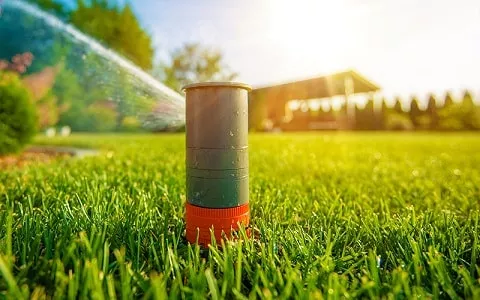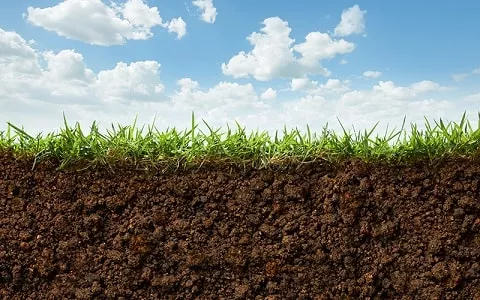
Proper watering of a lawn is so important to its health. A well-watered lawn will not only look nice, but it feels much better on bare feet. If you are having a hard time keeping your lawn looking nice there are some important things to consider, like for how long and when you should water your lawn? We attempt to tackle these and many related questions right here:
How Long Should I Water My Lawn?
Many conditions play a part in an efficient lawn irrigation system. There are few factors to consider such as:
- The rate and speed of water penetration.
- Soil water holding capacity.
- Depth of grass root system.
- Rate and speed of water loss.
Deep watering once every week will help you get the moisture and water deep down into the soil. Usually, it's about 30 minutes to get a half-inch of water when you run your sprinkler just like a rain gauge. So 20 minutes, 3 times per week will get an inch of water on your lawn, and 30 minutes 3 times per week will get 1-1/2" down.
In a clay type soil (soil which is very tight leaving little room for air) the water slowly penetrates and seeps through the tight soil. The average sprinkler can deliver water faster than the soil can absorb it. This creates runoff and puddles in low spots. On the flip side, when water is put on sandy soils (soils which are open with lots of drainages), the water will quickly drain right through the soil. You have to find out what kind of soil you have. Start with a soil test. By doing this, you will be able to determine watering times and duration. This way you won't be wasting water by running the sprinklers too long.
Recommended Sprinkler Run Times?
Most homeowners would say that the best time to run sprinklers is early in the morning. Setting your timer to avoid the mid-day sun helps to conserve water, preventing it from needlessly being lost to evaporation. If you water in the evening, then you risk fungal diseases, as your lawn is left wet throughout the night. Running your pop up sprinklers in the morning reduces the possibility of fungal problems. Keep in mind that watering needs change from season to season, and from region to region. The following all play major roles in intelligent yard irrigation:
- Turning on the sprinkler system for the season at the right time
- Watering for the correct period
- Choosing the correct time of day (4:00 AM - 10:00 AM)
Should I Run My Sprinklers Every Day?
You should avoid daily irrigation as weather and environmental conditions may vary from year to year or in different locations. However, in some very arid climates, there is a lot of division about whether or not summertime watering should be short and daily or infrequently with long, deep watering.
Should I Run My Sprinklers in the Winter?

Running your sprinkler during winter will vary depending on the type of lawn that you have. Warm-season grasses need balance for them to survive during winter. If there is rain, you may run your sprinkler once every 2 weeks. A good general rule of thumb is to turn your automatic sprinklers off in the winter and let the rain/snow do the work. If you go a couple of weeks without precipitation, run the sprinklers manually. However, this does not apply across the board. For example in Arizona, if you over-seeded your summer grass with rye for the winter, you will need to water it frequently, so keep your automatic sprinklers on.
Remember that lawns are more prone to drying out in the winter, as opposed to the summer, just because it's not as apparent of a threat, so be watchful.
Should I Run My Sprinklers Before a Freeze?
It is recommended that you run your sprinklers before a freeze. You absolutely do not want to run your sprinkler system during a hard freeze because it will cause damage to your irrigation system. In order to protect your sprinkler system by preventing it from running during a hard freeze, a good stop measure is the addition of rain and freeze sensor. A rain and freeze sensor will make sprinkler system controllers shut off automatically based on weather conditions. For example, the sensor will prevent your system from running in temperatures 35 degrees or below. It will also stop your system from running during heavy rainfall, which will conserve water and lower your water bill. This also prevents over-watering that can damage your lawn and garden. If you're interested, you may check our list of rain and freeze sensors.
Get Your Greener Healthier Lawn Today
If you are sick of having yellow dead grass there is always time to change. By following the simple tips above, you can do your part to give your lawn the look it's been missing. You will discover just how easy it is to water and care for your yard and will learn to enjoy the process. Don't go another day with your old yellow grass, start watering right today. And one last tip for proper lawn care. Go with a quality sprinkler system and always make sure it is properly equipped with uncompromised parts.
If you need replacement parts, we recommend going with a trusted manufacturer of irrigation products, so buy Rain Bird or Toro Sprinklers, or some other reputable name for the greenest results. If this was helpful in improving your understanding of when you should water your lawn, please share it!
Related Resources:
Winterizing Your Sprinklers
Late Summer Lawncare Tips
Planning a Sprinkler Install
Taking Care of Your Lawn in Late Summer
How Does a Rain/Freeze Sensor Work?
Irrigation Maintenance Checklist



